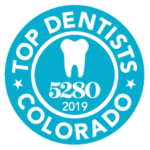Do you wake in the morning with your mouth feeling dry and sticky? Are you constantly thirsty or need to drink water throughout the night? Is it difficult to chew or swallow foods like bread or crackers without the aid of a drink of water? While Colorado’s dry climate can certainly cause some of these issues, those with dry mouth suffer from most of these symptoms on a regular basis.
We all must have saliva to clean and moisten our mouths and help with food digestion. Saliva controls bacteria in the mouth and helps prevent infection. However, if you suffer from dry mouth (known as xerostomia), it’s important to understand the reasons, the problems it can cause your mouth, and tips to feel better!
Common Causes of Dry Mouth
 Prescription and over-the-counter medicines are one of the most common causes of dry mouth. Antihistamines, allergy medications, painkillers, antidepressants, and diuretics can all result in the effect of dry mouth. Even drugs for acne, asthma, and epilepsy can cause dry mouth. Some dry mouth conditions are due to the treatment for cancer, including radiation, or as a side effect of certain diseases, such as diabetes and hypertension. Pregnancy, menopause, and hormone alterations can also cause the symptoms of dry mouth.
Prescription and over-the-counter medicines are one of the most common causes of dry mouth. Antihistamines, allergy medications, painkillers, antidepressants, and diuretics can all result in the effect of dry mouth. Even drugs for acne, asthma, and epilepsy can cause dry mouth. Some dry mouth conditions are due to the treatment for cancer, including radiation, or as a side effect of certain diseases, such as diabetes and hypertension. Pregnancy, menopause, and hormone alterations can also cause the symptoms of dry mouth.
How Dry Mouth Affects Your Overall Oral Health
Dry mouth is a problem for your oral health for many reasons. When the mouth’s soft tissues and gums are constantly in a dry state, they can become inflamed and are more susceptible to infection. Lack of saliva means the mouth is unable to clean itself regularly, resulting in tooth decay and periodontal disease, gum disease or bad breath.
Dry mouth can make dentures or implants feel more uncomfortable. A fungal infection, sometimes referred to as thrush, can form in sufferers of dry mouth. Insufficient saliva causes discomfort and a burning sensation in the mouth or a hoarse voice.
If you are suffering, there are ways to help ease or correct the problem of dry mouth!
Tips to Mitigate the Effects of Dry Mouth
 Oral health hygiene is crucial for dry mouth sufferers. Be sure to brush your teeth at least twice and day and floss regularly. Using an alcohol-free antimicrobial or antiseptic mouthwash can further help reduce bacteria in the mouth. Consider sucking on sugar-free candy or gum to encourage saliva to flow. Drink plenty of water and try to breathe through your nose, not your mouth. Using a room vaporizer or humidifier is always a good recommendation in homes in Colorado!
Oral health hygiene is crucial for dry mouth sufferers. Be sure to brush your teeth at least twice and day and floss regularly. Using an alcohol-free antimicrobial or antiseptic mouthwash can further help reduce bacteria in the mouth. Consider sucking on sugar-free candy or gum to encourage saliva to flow. Drink plenty of water and try to breathe through your nose, not your mouth. Using a room vaporizer or humidifier is always a good recommendation in homes in Colorado!
If you feel you are suffering from dry mouth or have experienced dry mouth symptoms for more than a week, make an appointment to see us! There are other options we have that can help you deal with, or correct, the presence of dry mouth. We are here to help!



